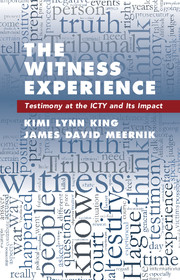Book contents
- Frontmatter
- Contents
- List of Figures page
- List of Tables
- Acknowledgments
- 1 Introduction to the Survey and Survey Methodology
- 2 Exploring the Gender, Ethnicity, and Trauma Characteristics of the Witness Sample
- 3 The Witnesses and Their Encounter with International Justice
- 4 The Witnesses and Human Security: The Social, Economic, and Security Consequences of Testimony
- 5 The Impact of Testifying
- 6 Perceptions of Justice
- 7 Conclusions
- Bibliography
- Index
4 - The Witnesses and Human Security: The Social, Economic, and Security Consequences of Testimony
Published online by Cambridge University Press: 11 November 2017
- Frontmatter
- Contents
- List of Figures page
- List of Tables
- Acknowledgments
- 1 Introduction to the Survey and Survey Methodology
- 2 Exploring the Gender, Ethnicity, and Trauma Characteristics of the Witness Sample
- 3 The Witnesses and Their Encounter with International Justice
- 4 The Witnesses and Human Security: The Social, Economic, and Security Consequences of Testimony
- 5 The Impact of Testifying
- 6 Perceptions of Justice
- 7 Conclusions
- Bibliography
- Index
Summary
INTRODUCTION
In 1994, the United Nations began articulating the contours of “human security” in the context of international relations. Broadly defined as having two components – “freedom from fear” (absence of violent conflict) – and a much broader dimension – “freedom from want” (socioeconomic security), both are vital in post-conflict societies (Kaldor 2007; Lautensach and Lautensach 2013; UNDP 1994). Human security exists when individuals can live without threats of violence to their personal and bodily integrity, and when they can live in conditions where basic human needs are met, including work, health, security, and employment. These issues of human security are especially critical in the context of witnesses testifying before international courts, for not only are nearly all of these individuals victims of war who have needs resulting from these conflicts, they are also courageous individuals who have stepped forward to contribute to national and international justice. The act of testifying brings with it human security consequences that are critical to witness well-being, as well as the ability of international tribunals to conduct trials. One only has to look at the problems the ICC has faced regarding witness safety and its subsequent decision to suspend the Kenyatta trial involving election violence in Kenya to understand that witnesses are a sine qua non of international criminal justice.
In this chapter, we examine the impact of witnesses testifying in the context of human security issues and consequences to better understand the degree to which they face social, economic, and physical consequences and which factors are most associated with the occurrence of threats to human security. In the first section of this chapter we review the findings of the survey to document the problems faced by witnesses, the sources of these problems, and the steps taken by witnesses to address them. In the second section of the chapter we analyze the role of the three theoretical lenses on human security – wartime trauma, ethnicity, and gender – to better understand how these three factors shape the witness experience. We find that while ethnicity can help us gain a better understanding of which witnesses are most likely to experience threats to human security, the level of wartime trauma and whether the individual is an ethnic minority in their community are among the more powerful factors associated with such threats.
- Type
- Chapter
- Information
- The Witness ExperienceTestimony at the ICTY and Its Impact, pp. 85 - 117Publisher: Cambridge University PressPrint publication year: 2017
- 2
- Cited by



